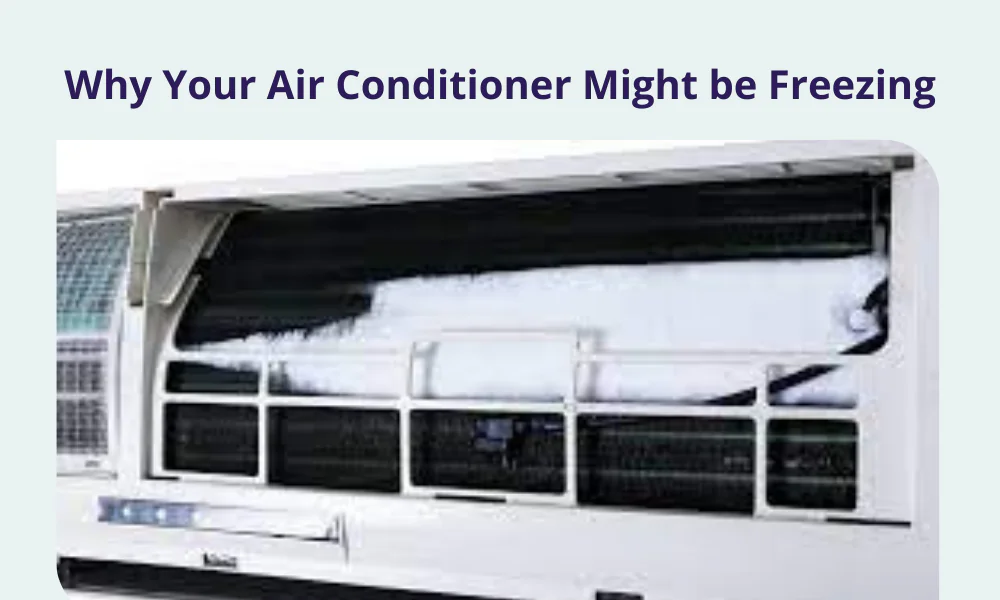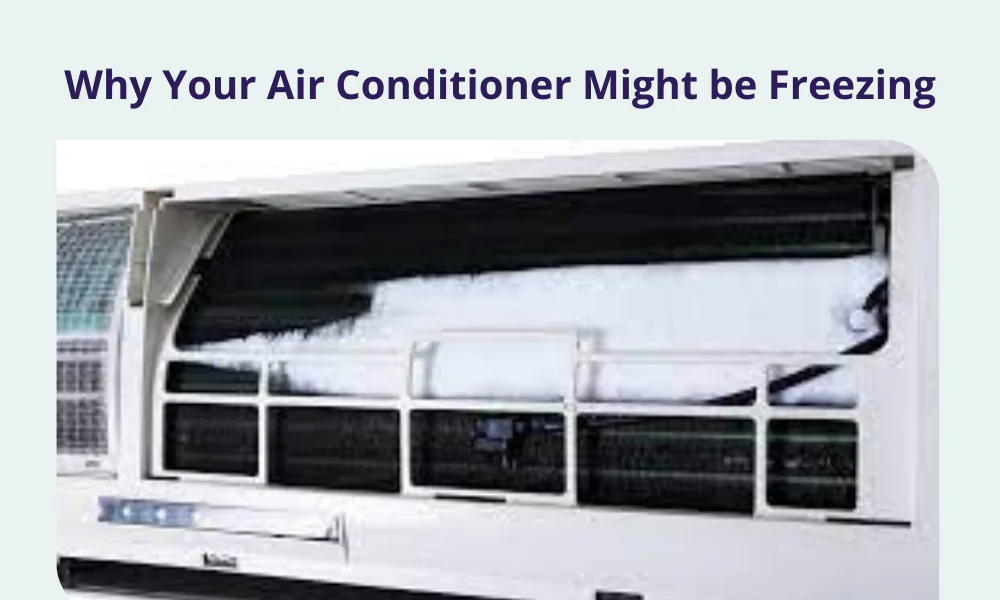Is your air conditioner freezing up? How can something that operates all day on the hottest days of the year freeze? Despite the irony of an AC freeze occurring in the summer, air conditioners freeze frequently. Many individuals lack the requisite awareness and insight of AC unit to solve this problem on their own. It’s a problem that can quickly turn a pleasant summer day into a scorching one.
How can you determine if you’re having a problem with freezing?
Checking the supply registers is a sure sign. Is it hot? If that’s the case, frozen evaporator coils are likely. Check for ice by opening the panel. Keep in mind that the lack of ice does not necessarily indicate the absence of a freezing problem. However, seeing ice almost always means your air conditioner is frozen.

Understanding the Joule-Thomson effect:
Before we look at the causes of your AC system freezing up, let’s have a look at how it works. To begin, we must recognize that temperature is the measure of a molecule’s energy. Because the molecules in the air have a lot of energy and are moving around quickly, the air feels heated. Low-energy molecules make up majority of the molecules in cold air. When the air in our air conditioners isn’t compressed, the temperature drops as it expands and the molecules slow. This is what the Joule-Thomson Effect demonstrates in thermodynamics. When molecules are crushed, they become agitated and heat up.
The purpose of an air conditioner is to cool down the refrigerant inside the evaporator coil so that when it exits the air conditioner, it cools the air inside your home and effectively removes the hot air. However, if the part in the air conditioner breaks down, the entire system is thrown off. This causes the evaporator coil to allow the refrigerant to cool too quickly, causing it to freeze over.
So, how do you avoid things going wrong in the cooling equation? An AC freeze can be caused by three different factors. By understanding the causes, you may stay ahead of the game and avoid having your air conditioner freeze. We’ve also included guidelines for resolving each cause, so if you do have an AC issue, you’ll be able to resolve it quickly. Maintaining your air conditioner will allow it to work more efficiently, saving you money on your energy bill while also preventing it from becoming an eyesore.
Reasons your AC might be freezing
Freezing occurs when airflow is obstructed
Air conditioners require a steady flow of air to prevent humidity from condensing on the coils and freezing. Make sure your air filters aren’t dusty or clogged to keep the airflow in your home moving enough to avoid disrupting the operation of your air conditioner. This reduces the amount of airflow in your home. Air filters are inexpensive and should be replaced regularly. Keeping your air conditioner clean and tuned up is also a smart idea for preventing airflow issues and other issues. Furthermore, according to the US Department of Energy, changing your HVAC filter can increase the efficiency of your HVAC system by 5% to 15%.
How to fix it?
Your air conditioner is already broken, and you noticed clogged air filters. It’s most likely a problem with obstructed airflow. The first step is to turn off the air conditioner and allow it to defrost. Turn on simply the fan for around an hour or two once it has had enough time to defrost. Use this opportunity to replace your air filter.
2. Mechanical problems or refrigerant leaks
Moving parts in air conditioners can become jammed, broken, or clogged. Refrigerant lines can kink, fans can stop spinning, filters can clog, and leaks can occur. Any of these factors result in a loss in pressure, allowing the refrigerant to expand excessively and become too cold. Refrigerant is also essential to keep your machine at a steady temperature. When the refrigerant level is too low, freezing is known to happen. Some of these problems are simpler and less costly to tackle than others. Any repair for a coolant leak will most likely only be temporary. It might be time to look into purchasing a new machine.
How to fix it?
Mechanical difficulties and leak fixes are not covered in this quick approach to AC freezing. It is preferable to handle these concerns with the help of a competent professional who is experienced with refrigerants. Even though refrigerants are safe to use in the home, they should be handled by someone who knows how to keep them contained. Contact an HVAC firm and have a professional come look at the situation if you suspect mechanical failure or leaks are the reason for a broken air conditioner. Regular tune-ups by an HVAC specialist can help prevent catastrophic complications with your air conditioner.
3. Faulty Blower Fan Motor
The blower fan is used to circulate the air in your air conditioner, allowing it to be distributed around your home. It spins the fan to distribute the heated or cooled air from the unit throughout your home.
When the blower fan in your air conditioner breaks or malfunctions, it reduces airflow and causes the air conditioner to freeze. When it stops working, the moisture on the coils might quickly freeze because there is no air circulating through the system.
How to fix it?
To inspect the blower fan, contact an HVAC specialist. They will inspect your fan’s general function as well as its rotation speed and power output. Depending on the extent of the damage, you may require repair or replacement. This problem can be avoided by having frequent inspections by HVAC technicians.
4. Clogged Drain System
Your HVAC system not only keeps your house cool but also keeps the humidity out. It also contains a drainage system that allows excess moisture to escape outside the house.
When the drain pan or condensate drain line becomes clogged, water backs up in the system and freezes on the coils as the refrigerant absorbs heat. As a result, the clogged drain system is caused by the accumulation of debris and a lack of maintenance.
How to fix it?
Shut down your system and look for your drain pan. Clean it with a soap and water solution after emptying it. After that, inspect the drain line and scrub it well with a wire brush. If it’s entirely blocked, wet/dry vacuuming may be required.
To avoid this problem in the future, regular AC repair is required. Pouring a bleach and water solution down the drain line every six months is recommended for complete cleaning and to prevent mold growth.
5. Dirty Evaporator Coils
Hair, pet dander, dust, grime, and mold are all filtered out of the air in your home by your air conditioner. However, because your AC filter can’t catch everything, the evaporator coils in your system can become caked in filth over time. You can hire an HVAC specialist to perform a deep cleaning, which can be necessary depending on the level of dirt. You can also try to clean up some of the dirt yourself.
Dirt on the coil obstructs heat transfer between the coil and the refrigerant. Because the refrigerant makes the coil extremely cold and there is little heat transfer, the temperature eventually drops, resulting in frozen AC coils.
How to fix it?
The quickest answer is to turn on the air conditioner in fan mode and wait for the ice to melt. It is recommended that you do not turn on the unit until your AC coils have been fully cleaned. Remove your evaporator coil’s front cover and clean it with a gentle brush or cloth. However, you’ll have to do this when the ice melts.
6. Running AC on Cold Nights
As previously stated, the air around the evaporator coils can become chilly during operation, necessitating a constant supply of warm air to prevent them from freezing over.
When the temperature drops below freezing, the refrigerant freezes any moisture in the air before it can circulate through the coils.
How to fix it?
To avoid this issue, set your air conditioner to fan mode and leave it running until the ice melts.
On chilly nights, avoid using your air conditioner. Instead, when the temperature drops at night, open the windows for a cool, breezy feeling.
Furthermore, you can program your unit to shut down if the temperature falls below a certain threshold using a smart thermostat or a smart AC controller.
7. Bad Compressor
A compressor is the core of an HVAC system and is in charge of compressing refrigerant and eliminating heat from your home.
Failure to maintain your air conditioner might damage the compressor’s performance and potentially lead it to fail.
A worn-out compressor can’t pump the refrigerant efficiently, resulting in frozen AC coils. The coils keep chilly all the time in this setting, and any condensation on them freezes.
How to fix it?
You can’t fix a broken compressor, so it’s best to replace it as soon as possible. Contact HVAC support to have your compressor evaluated.



0 Comments